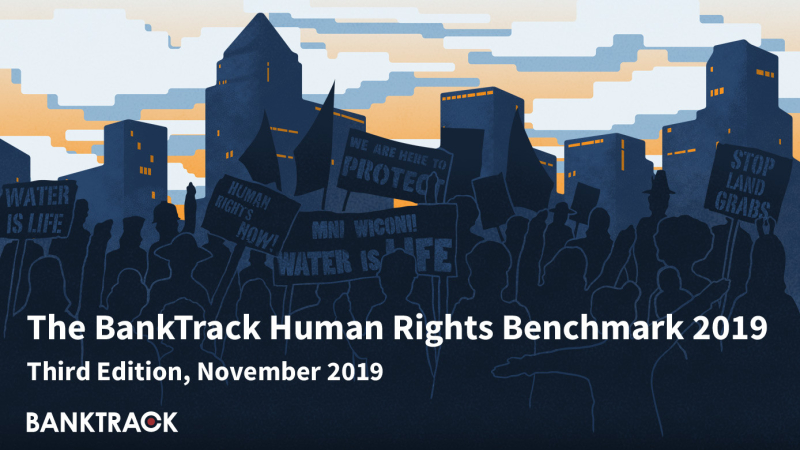BankTrack’s Global Human Rights Benchmark 2022 to be published in November
Giulia Barbos, Human Rights Researcher & Campaigner at BankTrack

Giulia Barbos, Human Rights Researcher & Campaigner at BankTrack
BankTrack’s Global Human Rights Benchmark 2022 is on track to be published in November 2022, with the first draft analysis of the human rights policies of 52 of the largest commercial banks around the world just concluded. BankTrack has now shared the draft scores with all banks covered in the benchmark, offering them the opportunity to provide feedback on their scores in the coming weeks.
The 2022 benchmark will be the fourth time BankTrack has assessed global banks on their alignment with the United Nations’ human rights rules for business, the Guiding Principles on Business and Human Rights (UNGPs). It also follows the publication of regional human rights benchmarks for banks headquartered in Africa and Asia, published in 2021 and 2022 respectively.
The UNGPs were unanimously endorsed by the UN Human Rights Council in June 2011 and provide the global authoritative standard on the human rights responsibilities of business. Last year, on the occasion of the 10th anniversary of the UNGPs, the UN published two reports, the first taking stock of the first decade, and the second setting out a roadmap for the next decade of business and human rights.
The stocktaking report noted that “movement is slow among financial sector actors”, and that “while there are signs of some progress among some actors, others are hardly moving.” BankTrack’s last Global Human Rights Benchmark, published in 2019, was cited as one of the studies evidencing this slow progress.
In setting out its roadmap for the next decade, the UN highlighted the need to raise the ambition and increase the pace of realising business respect for human rights. It also set out specific goals aimed at the financial sector.
Financial institutions – including private sector commercial banks, institutional investors, development finance institutions, and other sources of financial capital – should:
- Adopt human rights policies and embed human rights due diligence and develop grievance management approaches in line with the UNGPs in their own governance frameworks and in the investment decision-making process.
- Engage investees in constructive dialogue to promote: (1) the adoption of human rights policies, governance, due diligence and effective grievance mechanisms and (2) the provision of remedy for victims of human rights abuse where the investee has caused or contributed to adverse human rights impacts.
- Publicly disclose how the institution is addressing salient human rights risks and impacts connected with investment activities.
BankTrack’s 2022 Global Human Rights Benchmark will show whether the speed of progress has picked up following the disappointing 2019 results, and whether banks have made progress on the significant gaps that previous research identified. These include ensuring affected people are consulted in human rights due diligence; reporting on specific impacts identified and the banks’ efforts to address them; and providing access to remedy for those affected by bank finance, for example through a grievance mechanism.
Banks will be assessed against 14 criteria across four categories assessing their human rights policies; due diligence processes; their reporting on human rights impacts; and approach to remedying adverse impacts. They will receive a full score (1), half score (0.5) or no score (0) for each category, leading to a total score of between 0 and 14.
In addition, banks will be assessed on their responses to specific allegations of human rights violations, where community groups and their allies have written to banks seeking action. These “response tracking” scores are already embedded into BankTrack’s bank profiles.
An overview of the assessment criteria and a list of the banks to be assessed is published here.
Bank representatives from the 52 banks in scope which have not heard from us are kindly invited to contact Giulia Barbos at giulia@banktrack.org.
